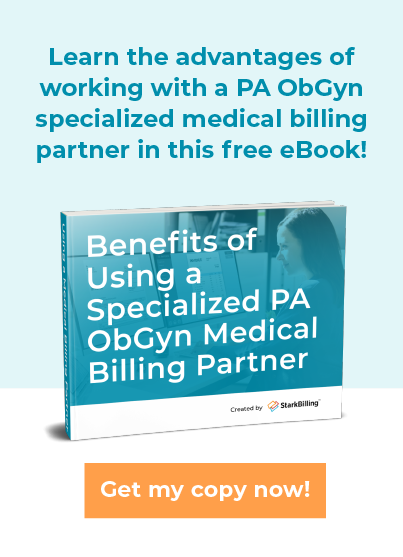Medical billing has a crucial role in ensuring the financial health and operational efficiency of a Pennsylvania ObGyn practice. This blog explores the nuances of this type of billing, emphasizing the importance of accuracy in coding for seamless practice management.
Understanding ObGyn Medical Billing
Understanding ObGyn medical billing involves a comprehensive exploration of its diverse services, ranging from routine check-ups to intricate surgical procedures. There are also standardized procedural codes that are pivotal for facilitating the billing processes associated with the services.
An in-depth examination of standard ObGyn procedures and their corresponding billing codes underscores the significance of coding accuracy. It’s crucial for the seamless flow of billing processes and for preventing financial discrepancies that may arise from inaccuracies in coding.
Precise coding contributes to the overall efficiency of billing processes and ensures timely reimbursement. It also highlights the potential consequences that coding errors can have on a medical practice’s revenue.
Key Components of ObGyn Medical Billing
Effective ObGyn medical billing hinges on several key components. First, accurate patient information and demographics are foundational elements to initiate the billing process successfully. These involve a thorough understanding of the crucial role that demographics play in verifying insurance eligibility, hence the necessity for precision in capturing patient data.
Second, procedural documentation is integral to the billing workflow, with a focus on detailing the steps involved in accurately coding ObGyn procedures. Comprehensive documentation also substantiates the coded procedures, ensuring transparency and accuracy in the billing process.
Finally, diagnosis coding and specificity have great significance in billing, hence the need for precise coding to facilitate claims approval. The impact of coding specificity on the approval process underscores the importance of guideline adherence. Insurance verification and eligibility checks are also vital to complete before the patient’s appointment so there are no surprises on either end. Effective communication and checking can significantly help your practice management.
Compliance and Regulations
ObGyn billing requires a keen understanding of regulatory frameworks, starting with HIPAA. In the realm of medical billing, its application is elucidated, including a detailed explanation of how compliance with HIPAA regulations is paramount for protecting patient confidentiality.
Moving beyond HIPAA, there’s a critical aspect of compliance regarding coding guidelines. It relates to the importance of adhering to industry coding guidelines in the realm of ObGyn billing and the impact of non-compliance on the overall integrity of the billing process. Knowing the proper handling of sensitive patient information also offers strategic insights for secure data management in strict accordance with privacy regulations.
By addressing these key elements, healthcare practitioners can ensure regulatory compliance and the highest standards of patient data security in the intricate landscape of medical billing within their ObGyn practices.
Challenges in ObGyn Medical Billing
Complexities are inherent when coding intricate ObGyn procedures. Fortunately, there are proactive solutions to effectively address and overcome these complexities. There are also ways of dealing with denied claims and the subsequent appeals process, along with valuable insights into minimizing these occurrences and expediting the appeals process for swift resolution.
The ever-evolving nature of medical coding should be underscored, as practitioners need to stay abreast of coding changes. By proactively addressing these facets, ObGyn professionals can enhance their proficiency in medical billing and provide optimal financial management for their practices.
Best Practices for ObGyn Medical Billing in a PA Practice
Elevating the proficiency of medical billing with your ObGyn practice encompasses strategic approaches aimed at staff development and technological integration. First, the importance of continuous training for billing staff should be underscored, as it reflects the need for ongoing education. This includes stressing the significance of professional development specific to ObGyn billing and offering tailored recommendations to empower staff with the latest insights and skills in the field.
Second, the integration of technology should be explored as a key driver for billing efficiency. Tools like electronic health records (EHR) and billing software can enhance operational efficiency within ObGyn practices. The benefits of automation in billing processes also showcase how it streamlines workflows and minimizes errors.
Finally, a focus on compliance and accuracy can be maintained by advocating for regular audits.
Importance of Team Collaboration
Effective coordination and communication form the bedrock of successful ObGyn medical billing. There’s an imperative need for seamless communication between healthcare providers and billing staff, emphasizing how collaborative efforts contribute to the accuracy of the billing processes.
It’s also vital to have effective interactions with insurance companies. Clear and concise communication is a pivotal factor in resolving billing issues efficiently. Healthcare practitioners are encouraged to foster collaborative environments that bridge the gap between clinical care and administrative processes, ultimately contributing to the success of medical billing within the practice.
Addressing Patient Billing Concerns
Addressing patient billing concerns is critical for fostering trust and transparency in healthcare practices. The key lies in maintaining openness and clarity in billing practices, ensuring that patients clearly understand the charges incurred. Transparency is crucial in the breakdown of costs and the presentation of billing statements.
Providing clear and understandable billing statements is paramount, as it empowers patients to comprehend their financial responsibilities, fostering a sense of control and confidence. Equally vital is the adept handling of patient inquiries and disputes, which necessitates effective communication and a commitment to resolving concerns promptly.
By prioritizing transparency in billing, offering comprehensible statements, and addressing patient inquiries with diligence, healthcare providers enhance patient satisfaction and contribute to a positive and trusting patient-provider relationship.
Technology and Tools for ObGyn Medical Billing
The advancement of tools and technology has revolutionized ObGyn medical billing, enhancing efficiency and accuracy within healthcare practices. EHR and dedicated billing software are crucial in streamlining data management and ensuring seamless communication between clinical and billing teams.
Integrating billing systems with practice management tools amplifies the effectiveness of billing processes and promotes a cohesive and interconnected healthcare ecosystem. Perhaps most notably, adopting automation in billing processes has emerged as a game-changer, reducing manual errors and expediting workflows. Automation accelerates billing procedures and minimizes the risk of oversights, ultimately contributing to improved accuracy and a more streamlined financial management system within ObGyn practices.
As technology evolves, these tools are indispensable assets in navigating the complexities of medical billing, offering efficiency gains, and promoting optimal practice performance.
Ongoing Education and Training
Within medical billing for ObGyn practices, the commitment to ongoing education and training is a linchpin for success. Keeping staff updated on coding changes is paramount, as it ensures that billing teams remain abreast of the latest industry updates and compliance requirements.
Pursuing continuing education for ObGyn billing specialists is also vital, equipping them with the specialized knowledge and skills needed to navigate the intricacies of this dynamic field. Resources for staying informed about industry updates are indispensable to facilitate this learning journey. These include reputable journals, online forums, and workshops that provide a platform for professionals to exchange insights and stay current with the latest developments in medical billing for the ObGyn industry.
By fostering a culture of continuous education, healthcare practices can fortify their teams with the expertise necessary to adapt to changes, maintain compliance, and optimize billing practices for sustained success.
Conclusion
Mastering ObGyn medical billing in a Pennsylvania practice requires a comprehensive understanding of coding, compliance, and collaboration. By emphasizing the importance of accuracy and ongoing education, this guide serves as a roadmap for navigating the complexities of billing in the field of ObGyn. Continuous improvement, technological integration, and a commitment to collaboration are crucial elements for success.
Take your ObGyn practice and financial health to new heights with the help of a Pennsylvania specialized medical billing partner who delivers reliable, responsive, and timely quality work. Contact StarkBilling today.






